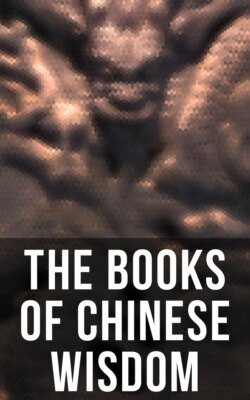Читать книгу The Books of Chinese Wisdom - Mencius - Страница 59
На сайте Литреса книга снята с продажи.
ОглавлениеHexagram XLIII.43 Kwâi
Table of Contents
Kwâi requires (in him who would fulfil its meaning) the exhibition (of the culprit's guilt) in the royal court, and a sincere and earnest appeal (for sympathy and support), with a consciousness of the peril (involved in cutting off the criminal). He should (also) make announcement in his own city, and show that it will not be well to have recourse at once to arms. (In this way) there will be advantage in whatever he shall go forward to.
1. The first line, undivided, shows its subject in (the pride of) strength advancing with his toes. He goes forward, but will not succeed. There will be ground for blame.
2. The second line, undivided, shows its subject full of apprehension and appealing (for sympathy and help). Late at night hostile measures may be (taken against him), but he need not be anxious about them.
3. The third line, undivided, shows its subject (about to advance) with strong (and determined) looks. There will be evil. (But) the superior man, bent on cutting off (the criminal), will walk alone and encounter the rain, (till he be hated by his proper associates) as if he were contaminated (by the others). (In the end) there will be no blame against him.
4. The fourth line, undivided, shows one from whose buttocks the skin has been stripped, and who walks slowly and with difficulty. (If he could act) like. a sheep led (after its companions), occasion for repentance would disappear. But though he hear these words, he will not believe them.
5. The fifth line, undivided, shows (the small men like) a bed of purslain, which ought to be uprooted with the utmost determination. (The subject of the line having such determination), his action, in harmony with his central position, will lead to no error or blame.
6. The sixth line, divided, shows its subject without any (helpers) on whom to call. His end will be evil.
Footnotes
43. In Kwâi we have the hexagram of the third month, when the last remnant, cold and dark, of winter, represented by the sixth line, is about to disappear before the advance of the warm and bright days of the approaching summer. In the yin line at the top king Wăn saw the symbol of a small or bad man, a feudal prince or high minister, lending his power to maintain a corrupt government, or, it might be, a dynasty that was waxen old and ready to vanish away; and in the five undivided lines he saw the representatives of good order, or, it might be, the dynasty which was to supersede the other. This then is the subject of the hexagram,--how bad men, statesmen corrupt and yet powerful, are to be put out of the way. And he who would accomplish the task must do so by the force of his character more than by force of arms, and by producing a general sympathy on his side.
The Thwan says that he must openly denounce the criminal in the court, seek to awaken general sympathy, and at the same time go about his enterprise, conscious of its difficulty and danger. Among his own adherents, moreover, as if it were in his own city, he must make it understood how unwillingly he takes up arms. Then let him go forward, and success will attend him.
Line 1 is strong, the first line of that trigram, which expresses the idea of strength. But it is in the lowest place. The stage of p. 154 the enterprise is too early, and the preparation too small to make victory certain. Its subject had better not take the field.
Line 2 is strong, and central, and its subject is possessed with the determination to do his part in the work of removal. But his eagerness is tempered by his occupancy of an even place; and he is cautious, and no attempts, however artful, to harm him will take effect.
Line 3 is strong, and its subject displays his purpose too eagerly. Being beyond the central position, moreover, gives an indication of evil. Lines 3 and 6 are also proper correlates; and, as elsewhere in the Yî, the meeting of yin and yang lines is associated with falling rain. The subject of 3, therefore, communicates with 6, in a way that annoys his associates; but nevertheless he commits no error, and, in the end, incurs no blame.
Line 4 is not in the centre, nor in an odd place, appropriate to it as undivided. Its subject therefore will not be at rest, nor able to do anything to accomplish the idea of the hexagram. He is symbolised by a culprit, who, according to the ancient and modern custom of Chinese courts, has been bastinadoed till he presents the appearance in the Text. Alone he can do nothing; if he could follow others, like a sheep led along, he might accomplish something, but he will not listen to advice.
Purslain grows in shady places, and hence we find it here in close contiguity to the topmost line, which is yin. As 5 is the ruler's seat, evil may come to him from such contiguity, and strenuous efforts must be made to prevent such an evil. The subject of the line, the ruler in the central place, will commit no error. It must be allowed that the symbolism in this line is not easily managed.
The subject of the 6th line, standing alone, may be easily disposed of.
